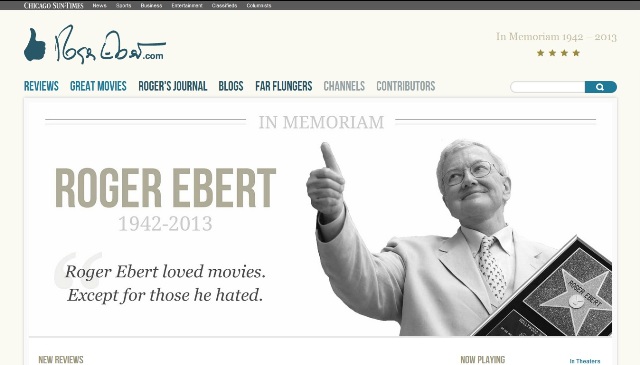Roger Ebert's New Redesigned Website Debuts Today, Proving His Brand Awareness
By Chuck Sudo in Arts & Entertainment on Apr 9, 2013 10:00PM

Roger Ebert’s newly redesigned website launched today, nearly a week after the legendary Chicago Sun-Times film critic died from cancer. As Ebert promised, it is a joy to navigate, with a highly searchable database of his movie reviews, his “Great Movies” essay series, easy-to-find blogs from Ebert, wife Chaz, longtime website editor Jim Emerson, Tom Shales and Ebert’s “Far Flung Correspondents.”
The website’s re-launch, while welcome and magnificent, comes at a time when his death could mean a decrease in traffic for the Sun-Times. Ebert Digital owns RogerEbert.com and it will continue to be linked to the Sun-Times media websites. As Crain’s Chicago Business notes (via the Alliance for Audited Media), unique monthly visits and page views from Ebert’s site accounted for roughly 40 percent of traffic to the Sun-Times website.
“He was very central to the Sun-Times identity, and I'm sure his loss will be harmful to the paper,” said John Morton, a longtime newspaper industry consultant in Silver Spring, Md. For a city like Chicago, where two newspapers are still competing head-to-head, a rarity in today's newspaper industry, the impact could be more intense, Mr. Morton said.A Sun-Times spokeswoman declined to comment on the business impact of Mr. Ebert's death.
The relaunch also shows how firm a grasp Ebert had not only on the current media landscape, but his own brand and how to grow and protect it. Chicago Tribune business columnist Phil Rosenthal wrote that, long before even Ebert’s editors knew what they had in him, he did.
He was first and foremost a newspaperman, specifically a Chicago newspaperman.Other titles and descriptions could be attached. But long after the bulk of his income and popularity came from other sources, he stayed true to himself and his craft and never abandoned Chicago, the Sun-Times or his journalistic approach. Only when you have defined yourself and identified your core product can you start to consider what can and can't be changed in the name of expanding your offerings.
Ebert understood, perhaps intuitively, what made his brand what it was at a time when the term "personal brand" would have been greeted with blank stares. A heavyset man in glasses on television was accepted more readily by TV audiences in no small part because he never presented himself as a TV person.
Ebert was never shy to share his advice with others. On more than one occasion, Oprah Winfrey has stated it was Ebert who suggested she syndicate her television show while on a date, a claim Ebert corroborated.
"I don't know what to do," she told me. "The ABC stations want to syndicate my show. So does King World. The problem with syndication is that if your show isn't successful, you're off the air in three months. The ABC stations own themselves, so they can keep you on. Which way do you think I should go?"I took a napkin and a ballpoint pen, and made some simple calculations.
Line 1: How much I made in a year for doing a syndicated television show.
Line 2: Times 2, because Siskel made the same.
Line 3: Times 2, because Oprah would be on for an hour, instead of half an hour.
Line 4: Times 5, because she would be on five days a week.
Line 5: Times 2, because her ratings would be at least twice as big as "Siskel & Ebert."
I pushed the napkin across the table. Oprah studied it for 10 seconds.
"Rog, I'm going with King World," she said.